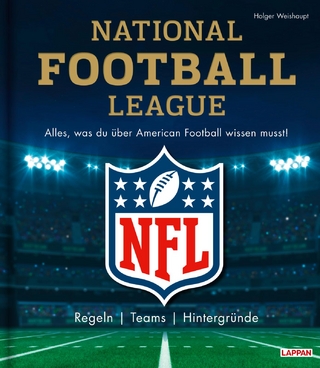
Creating the National Pastime
Baseball Transforms Itself, 1903-1953
Seiten
1996
Princeton University Press (Verlag)
978-0-691-03488-1 (ISBN)
Princeton University Press (Verlag)
978-0-691-03488-1 (ISBN)
- Titel ist leider vergriffen;
keine Neuauflage - Artikel merken
This work explores the progession of baseball to an almost mythical status as an idyllic game. In the period between 1903 and 1953 baseball was transformed into the national pastime of the USA, and the book examines the way in which the sport was run, putting it into a socio-economic context.
At a time when many baseball fans wish for the game to return to a purer past, G. Edward White shows how seemingly irrational business decisions, inspired in part by the self-interest of the owners but also by their nostalgia for the game, transformed baseball into the national pastime. Not simply a professional sport, baseball has been treated as a focus of childhood rituals and an emblem of American individuality and fair play throughout much of the twentieth century. It started out, however, as a marginal urban sport associated with drinking and gambling. White describes its progression to an almost mythic status as an idyllic game, popular among people of all ages and classes. He then recounts the owners' concerted efforts, often supported by the legal system, to preserve this image. Baseball grew up in the midst of urban industrialisation during the Progressive Era, and the emerging steel and concrete baseball parks encapsulated feelings of neigh-bourliness and associations with the rural leisure of bygone times.
According to White, these nostalgic themes, together with personal financial concerns, guided owners toward practices that in retrospect appear unfair to players and detrimental to the progress of the game. Reserve clauses, blacklisting, and limiting franchise territories, for example, were meant to keep a consistent roster of players on a team, build fan loyalty, and maintain the game's local flavour. These practices also violated anti-trust laws and sig-nificantly restricted the economic power of the players. Owners vigorously fought against innovations, ranging from night games and radio broadcasts to the inclusion of African-American players. Nonetheless, the image of baseball as a spirited civic endeavour persisted, even in the face of out-right corruption, as witnessed in the courts' leniency toward the participants in the Black Sox scandal of 1919. White's story of baseball is intertwined with changes in technology and business in American and with changing attitudes toward race and ethnicity. The time is fast approaching, he concludes, when we must consider whether baseball is still regarded as the national pastime and whether protecting its image is worth the effort.
At a time when many baseball fans wish for the game to return to a purer past, G. Edward White shows how seemingly irrational business decisions, inspired in part by the self-interest of the owners but also by their nostalgia for the game, transformed baseball into the national pastime. Not simply a professional sport, baseball has been treated as a focus of childhood rituals and an emblem of American individuality and fair play throughout much of the twentieth century. It started out, however, as a marginal urban sport associated with drinking and gambling. White describes its progression to an almost mythic status as an idyllic game, popular among people of all ages and classes. He then recounts the owners' concerted efforts, often supported by the legal system, to preserve this image. Baseball grew up in the midst of urban industrialisation during the Progressive Era, and the emerging steel and concrete baseball parks encapsulated feelings of neigh-bourliness and associations with the rural leisure of bygone times.
According to White, these nostalgic themes, together with personal financial concerns, guided owners toward practices that in retrospect appear unfair to players and detrimental to the progress of the game. Reserve clauses, blacklisting, and limiting franchise territories, for example, were meant to keep a consistent roster of players on a team, build fan loyalty, and maintain the game's local flavour. These practices also violated anti-trust laws and sig-nificantly restricted the economic power of the players. Owners vigorously fought against innovations, ranging from night games and radio broadcasts to the inclusion of African-American players. Nonetheless, the image of baseball as a spirited civic endeavour persisted, even in the face of out-right corruption, as witnessed in the courts' leniency toward the participants in the Black Sox scandal of 1919. White's story of baseball is intertwined with changes in technology and business in American and with changing attitudes toward race and ethnicity. The time is fast approaching, he concludes, when we must consider whether baseball is still regarded as the national pastime and whether protecting its image is worth the effort.
G. Edward White is University Professor and John B. Minor Professor of Law and History at the University of Virginia. His books include The Marshall Court and Cultural Change, 1815-1835 and Justice Oliver Wendell Holmes: Law and the Inner Self.
| Zusatzinfo | 25 halftones |
|---|---|
| Verlagsort | New Jersey |
| Sprache | englisch |
| Maße | 197 x 254 mm |
| Gewicht | 482 g |
| Themenwelt | Sachbuch/Ratgeber ► Sport ► Ballsport |
| Sozialwissenschaften | |
| Wirtschaft | |
| ISBN-10 | 0-691-03488-5 / 0691034885 |
| ISBN-13 | 978-0-691-03488-1 / 9780691034881 |
| Zustand | Neuware |
| Haben Sie eine Frage zum Produkt? |
Mehr entdecken
aus dem Bereich
aus dem Bereich
Buch | Hardcover (2024)
Lappan (Verlag)
25,00 €
90 verdammt gute Fragen an Toni Kroos
Buch | Softcover (2023)
Heyne (Verlag)
14,00 €


